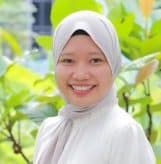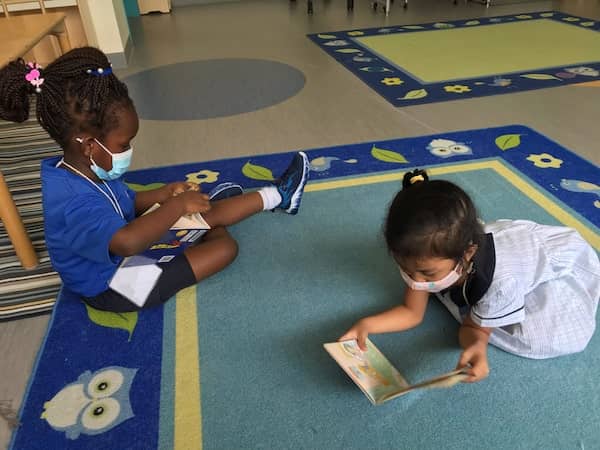To communicate effectively using language, Early Childhood learners must practise four essential skills. We call these language skills. They include: listening, speaking and presenting, reading, and writing.
At One World International School (OWIS), we believe in the benefits of play-based and inquiry-led learning for our youngest learners at our Nanyang and Suntec campuses. We also believe in using this education approach to build a firm foundation in English language and literacy skills.
OWIS’ Approach to Developing the Four Language Skills
Listening
Listening is an essential skill for early learners because it opens doors to communication. Listening includes hearing what the teacher and classmates say and then responding accordingly. There’s a give-and-take to effective listening, but it’s not necessarily a skill that comes naturally to all young children. Therefore, to strengthen listening skills, teachers may read books aloud to the class and then ask questions afterwards.
To have solid listening skills, children must be able to do the following:
- Listen to stories, their teacher, or their classmates for consistently longer periods of time.
- Share their impressions of what they heard with the teacher or the class.
Speaking and Presenting

As children develop skills in speaking and presenting, they’re better able to talk about what they’ve heard, seen, or experienced. Their vocabularies increase, and they’re able to express their thoughts and impressions to others effectively. They can talk about projects on which they’ve worked with teachers and the class. They can talk about pictures and messages, and they learn age-appropriate skills in presentation. At One World International School in Singapore, even early learners have ample opportunities to share their work and achievements with others.
Reading
In our leading Early Childhood programme in Singapore, children develop essential skills in reading, spelling, comprehension, and more. Children learn sight words, and they learn how to decode words using their knowledge of letters and sounds. They can identify the long and short sounds of vowels and consonants, and also identify the main events of a story and recognise who the narrator is. They learn the basics of phonics in Early Childhood and can use these skills to decipher simple unknown words.
Writing
Our Early Childhood writing programme helps young children learn fundamental writing skills on which they can build as they progress through the grade levels. Initially, they learn how to form uppercase and lowercase letters, write simple numbers, and put letters together to form words. Next, they work on simple rules of grammar and punctuation, phonetic spellings and the formation of simple sentences.
Classroom Techniques for Teaching English in an Engaging Way

Our Early Childhood programme is among the popular preschool programmes in Singapore because we focus on age-appropriate instruction and play-based learning. Our classrooms are designed to accommodate movement and activity. In our English Language lessons, we incorporate play-based activities to teach phonics, presentation, reading, writing, listening, and more. Specific methods involve:
- Journaling, where children design their own books in which they can then draw, label and write
- Show and Tell, where children practise their skills in public speaking and presentation using a favourite toy or object from home
- English Board, where work is proudly displayed for the class to admire
- Story time at home, where books are sent home with children with the expectation that parents will play a supportive role
- Library time, where children choose their own books to read
Additionally, OWIS also emphasises personalised instruction, particularly for encouraging non-native English speakers.
How OWIS Supports Non-Native English Speakers in Early Childhood
Our experienced and caring preschool teachers at our campuses in Singapore use time-tested techniques to support and nurture non-native English Speakers in the following ways:
- By being welcoming and encouraging: Our teachers give lots of praise to keep motivation levels and confidence high. This will also encourage non-native English speakers to keep communicating and testing their new language abilities.
- Teaching functional/survival vocabulary in class: These words and phrases are important for the children to be able to communicate their key needs and feelings throughout the school day. Once students have mastered these phrases, our teachers build up their vocabulary, ensuring they are confident with each word before moving on to the next.
- Using differentiated resources: Our educators use the range of differentiated resources that are available in our classrooms for personalised instruction and to ensure that our students are working at the right level for them.
- Helping students to form friendships: Our students are assigned a buddy in class to encourage them to enhance their communication skills.
- Encouraging discussions: Our educators encourage conversations about different cultures, heritages and countries in our class and create spaces where students feel comfortable telling their peers about their experiences in their language. Through this engagement, everyone enjoys a fun language exchange session where native English speakers try to learn some words of the other languages, too.
Contact us today if you’re interested in learning more about Early Childhood education at our OWIS Suntec or OWIS Nanyang campuses in Singapore. We follow the IB Primary Years Programme (IB PYP), underpinned by the English National Curriculum to help children accomplish age-appropriate learning outcomes. We’re happy to tell you more in our school tour and answer any questions you may have regarding our Early Childhood Programmes.















